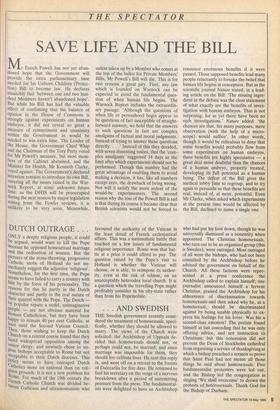THE SPECTATOR
SAVE LIFE AND THE BILL
Mr Enoch Powell has not yet aban- doned hope that the Government will provide the extra parliamentary time needed for his Unborn Children (Protec- tion) Bill to become law. He declares staunchly that 'between one and two hun- dred Members haven't abandoned hope'. But while his Bill has had the valuable effect of confirming that the balance of opinion in the House of Commons is strongly against experiments on human embryos, it did not reveal so great a measure of commitment and unanimity within the Government as would be needed to win extra time. The Leader of the House, the Government Chief Whip and the Chairman of the Tory Party voted for Mr Powell's measure, but most mem- bers of the Cabinet abstained, and the Minister for Health, Mr Kenneth Clarke, voted against. The Government's declared intention remains to introduce its own Bill, Covering all the issues raised in the War- nock Report, at some unknown future time: as the DHSS will be preoccupied during the next session by major legislation arising from the Fowler reviews, it is unlikely to be very soon. Meanwhile, unless taken up by a Member who comes at the top of the ballot for Private Members' Bills, Mr Powell's Bill will die. This is for two reasons a great pity. First, any law which is founded on Warnock can be expected to avoid the fundamental ques- tion of when human life begins. The Warnock Report includes the extraordin- ary passage: 'Although the questions of when life or personhood begin appear to be questions of fact susceptible of straight- forward answers, we hold that the answers to such questions in fact are complex amalgams of factual and moral judgments. Instead of trying to answer these questions directly. . . .' Instead of this they decided, with seven dissenting voices, that the 'com- plex amalgams' suggested 14 days as the limit after which experiments should not be performed. Though this number had the great advantage of enabling them to avoid making a decision, it has, like all numbers except zero, the drawback of being wrong. Nor will it satisfy the more ardent of the would-be experimenters. The second reason why the loss of the Powell Bill is sad is that during its course it became clear that British scientists would not be forced to renounce enormous benefits if it were passed. These supposed benefits lead many people reluctantly to forsake the belief that human life begins at conception. But as the scientific journal Nature stated, in a lead- ing article on the Bill: 'The missing ingre- dient in the debate was the clear statement of what exactly are the benefits of inves- tigation with human embryos. That is not surprising, for as yet there have been no such investigations.' Nature added: 'the chances are that, for many purposes, mere observation (with the help of a micro- scope) would suffice'. In other words, though it would be ridiculous to deny that some benefitswould probably flow from some experiments on human embryos, these benefits re highly speculative — a' great deal mord doubtful than the chances of a human 9mbryo, properly treated, developing its ' ull potential as a human being. The de eat of the Bill gives the medical lobby ime to regroup, and to try again to persuade us that these benefits are real, instead of, at most, potential. Even Mr Clarke, when asked which experiments at the present time would be affected by the Bill, declined to name a single one.














































 Previous page
Previous page